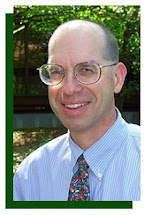
When I was in graduate school in the late 1980s, while working in a Forestry and Natural Resources computer lab at Purdue University somewhere near midnight, a fellow student asked me a philosophical question. It's often easy to be philosophical around midnight, especially if you are tired and beginning to look for something else to do rather than whatever you have been working on or studying about for the last 16 hours. He asked something like, "What do you think will be your most significant impact on the future?"
My sons at that time were 4 years old and 2 years old. My response was immediate; my children. The other student seemed not to understand, since he had been thinking about what impacts would result from our efforts in the field of resource management and he did not have children to consider.
I did not know then, and may never know completely, what differences my children will make for others and in the future. However, they impact the lives of others every day in some way. And the actions that they take, the example they set, how they vote or don't vote, and how they influence the views of others about natural resources, regardless of their career choices, to either contribute to the sustainability of fish, forest, and wildlife resources or to diminish those resources, may have greater impacts for their children and future generations than whatever I accomplish in the field of resource management.
I do think my efforts can make a difference for conservation in some way for the future. But I have no doubts that it is our combined efforts, and the efforts of our children and future generations of Missourians, that will determine the success or failure of conservation in Missouri, in the United States, and in the world. It's been up to me to provide opportunities for my children to understand the natural world and their place in it. It's been their choice to experience those opportunities and then consider what the outdoor world and the next generation of conservation means to them. To have positive impacts, they can certainly follow the examples provided by Missourians of the past that supported conservation, were aware of the natural world, and took actions to ensure that resources were managed both for the present and the future.
Perhaps the information I provide in these postings can help increase awareness about fish, forest, and wildlife resources in Missouri and the conservation efforts of the Missouri Department of Conservation. Then, fish, forests, wildlife, and the quality of life for all Missourians might continue to be improved for many of the next generations.
More information about conservation and opportunities to experience the outdoors of Missouri is available at: http://www.missouriconservation.org
My sons at that time were 4 years old and 2 years old. My response was immediate; my children. The other student seemed not to understand, since he had been thinking about what impacts would result from our efforts in the field of resource management and he did not have children to consider.
I did not know then, and may never know completely, what differences my children will make for others and in the future. However, they impact the lives of others every day in some way. And the actions that they take, the example they set, how they vote or don't vote, and how they influence the views of others about natural resources, regardless of their career choices, to either contribute to the sustainability of fish, forest, and wildlife resources or to diminish those resources, may have greater impacts for their children and future generations than whatever I accomplish in the field of resource management.
I do think my efforts can make a difference for conservation in some way for the future. But I have no doubts that it is our combined efforts, and the efforts of our children and future generations of Missourians, that will determine the success or failure of conservation in Missouri, in the United States, and in the world. It's been up to me to provide opportunities for my children to understand the natural world and their place in it. It's been their choice to experience those opportunities and then consider what the outdoor world and the next generation of conservation means to them. To have positive impacts, they can certainly follow the examples provided by Missourians of the past that supported conservation, were aware of the natural world, and took actions to ensure that resources were managed both for the present and the future.
Perhaps the information I provide in these postings can help increase awareness about fish, forest, and wildlife resources in Missouri and the conservation efforts of the Missouri Department of Conservation. Then, fish, forests, wildlife, and the quality of life for all Missourians might continue to be improved for many of the next generations.
More information about conservation and opportunities to experience the outdoors of Missouri is available at: http://www.missouriconservation.org
Conservation education information is available at: http://www.mdc.mo.gov/teacher/ and information about education opportunities and events, from beginning archery and dutch oven cooking, to shooting and hunter education, to tree education and more, is available at: http://www.mdc.mo.gov/applications/events/teacher.htm


No comments:
Post a Comment